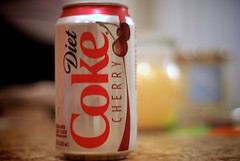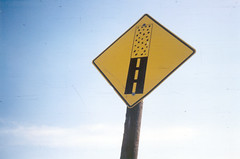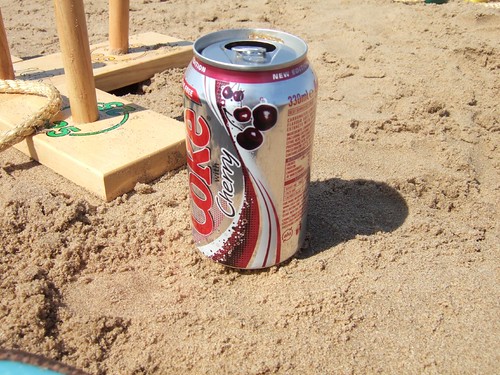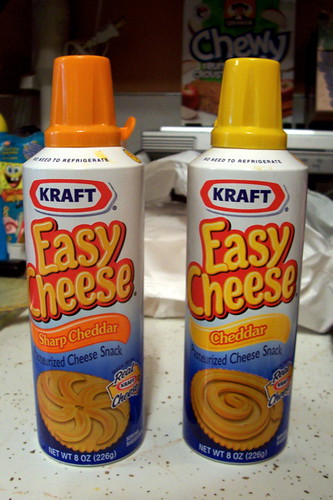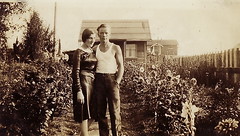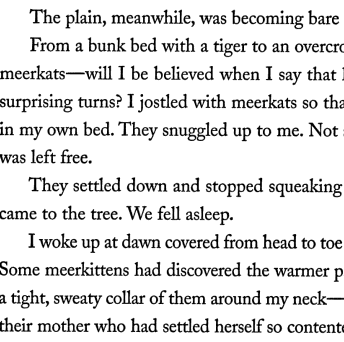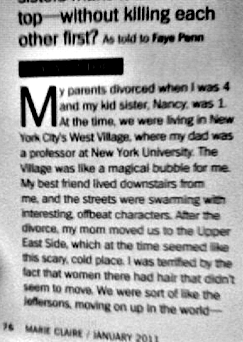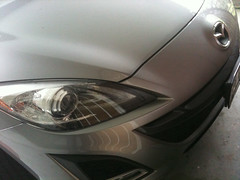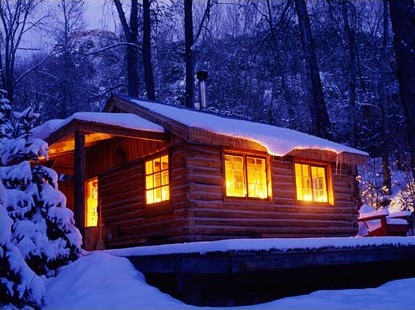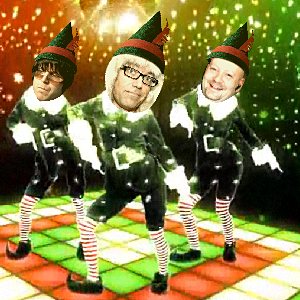Here it is. I'm dead, and this is my last post to my blog. In advance, I asked that once my body finally shut down from the punishments of my cancer, then my family and friends publish this prepared message I wrote—the first part of the process of turning this from an active website to an archive.
If you knew me at all in real life, you probably heard the news already from another source, but however you found out, consider this a confirmation: I was born on June 30, 1969 in Vancouver, Canada, and I died in Burnaby on May 3, 2011, age 41, of complications from stage 4 metastatic colorectal cancer. We all knew this was coming.
That includes my family and friends, and my parents Hilkka and Juergen Karl. My daughters Lauren, age 11, and Marina, who's 13, have known as much as we could tell them since I first found I had cancer. It's become part of their lives, alas.
Airdrie
Of course it includes my wife Airdrie (née Hislop). Both born in Metro Vancouver, we graduated from different high schools in 1986 and studied Biology at UBC, where we met in '88. At a summer job working as park naturalists that year, I flipped the canoe Air and I were paddling and we had to push it to shore.
We shared some classes, then lost touch. But a few years later, in 1994, I was still working on campus. Airdrie spotted my name and wrote me a letter—yes! paper!—and eventually (I was trying to be a full-time musician, so chaos was about) I wrote her back. From such seeds a garden blooms: it was March '94, and by August '95 we were married. I have never had second thoughts, because we have always been good together, through worse and bad and good and great.
However, I didn't think our time together would be so short: 23 years from our first meeting (at Kanaka Creek Regional Park, I'm pretty sure) until I died? Not enough. Not nearly enough.
What was at the end
I haven't gone to a better place, or a worse one. I haven't gone anyplace, because Derek doesn't exist anymore. As soon as my body stopped functioning, and the neurons in my brain ceased firing, I made a remarkable transformation: from a living organism to a corpse, like a flower or a mouse that didn't make it through a particularly frosty night. The evidence is clear that once I died, it was over.
So I was unafraid of death—of the moment itself—and of what came afterwards, which was (and is) nothing. As I did all along, I remained somewhat afraid of the process of dying, of increasing weakness and fatigue, of pain, of becoming less and less of myself as I got there. I was lucky that my mental faculties were mostly unaffected over the months and years before the end, and there was no sign of cancer in my brain—as far as I or anyone else knew.
As a kid, when I first learned enough subtraction, I figured out how old I would be in the momentous year 2000. The answer was 31, which seemed pretty old. Indeed, by the time I was 31 I was married and had two daughters, and I was working as a technical writer and web guy in the computer industry. Pretty grown up, I guess.
Yet there was much more to come. I had yet to start this blog, which recently turned 10 years old. I wasn't yet back playing drums with my band, nor was I a podcaster (since there was no podcasting, nor an iPod for that matter). In techie land, Google was fresh and new, Apple remained "beleaguered," Microsoft was large and in charge, and Facebook and Twitter were several years from existing at all. The Mars rovers Spirit and Opportunity were three years away from launch, while the Cassini-Huygens probe was not quite half-way to Saturn. The human genome hadn't quite been mapped yet.
The World Trade Center towers still stood in New York City. Jean Chrétien remained Prime Minister of Canada, Bill Clinton President of the U.S.A., and Tony Blair Prime Minister of the U.K.—while Saddam Hussein, Hosni Mubarak, Kim Jong-Il, Ben Ali, and Moammar Qaddafi held power in Iraq, Egypt, North Korea, Tunisia, and Libya.
In my family in 2000, my cousin wouldn't have a baby for another four years. My other cousin was early in her relationship with the man who is now her husband. Sonia, with whom my mother had been lifelong friends (ever since they were both nine), was still alive. So was my Oma, my father's mom, who was then 90 years old. Neither my wife nor I had ever needed long-term hospitalization—not yet. Neither of our children was out of diapers, let alone taking photographs, writing stories, riding bikes and horses, posting on Facebook, or outgrowing her mother's shoe size. We didn't have a dog.
And I didn't have cancer. I had no idea I would get it, certainly not in the next decade, or that it would kill me.
Missing out
Why do I mention all this stuff? Because I've come to realize that, at any time, I can lament what I will never know, yet still not regret what got me where I am. I could have died in 2000 (at an "old" 31) and been happy with my life: my amazing wife, my great kids, a fun job, and hobbies I enjoyed. But I would have missed out on a lot of things.
And many things will now happen without me. As I wrote this, I hardly knew what most of them could even be. What will the world be like as soon as 2021, or as late as 2060, when I would have been 91, the age my Oma reached? What new will we know? How will countries and people have changed? How will we communicate and move around? Whom will we admire, or despise?
What will my wife Air be doing? My daughters Marina and Lolo? What will they have studied, how will they spend their time and earn a living? Will my kids have children of their own? Grandchildren? Will there be parts of their lives I'd find hard to comprehend right now?
What to know, now that I'm dead
There can't be answers today. While I was still alive writing this, I was sad to know I'll miss these things—not because I won't be able to witness them, but because Air, Marina, and Lauren won't have me there to support their efforts.
It turns out that no one can imagine what's really coming in our lives. We can plan, and do what we enjoy, but we can't expect our plans to work out. Some of them might, while most probably won't. Inventions and ideas will appear, and events will occur, that we could never foresee. That's neither bad nor good, but it is real.
I think and hope that's what my daughters can take from my disease and death. And that my wonderful, amazing wife Airdrie can see too. Not that they could die any day, but that they should pursue what they enjoy, and what stimulates their minds, as much as possible—so they can be ready for opportunities, as well as not disappointed when things go sideways, as they inevitably do.
I've also been lucky. I've never had to wonder where my next meal will come from. I've never feared that a foreign army will come in the night with machetes or machine guns to kill or injure my family. I've never had to run for my life (something I could never do now anyway). Sadly, these are things some people have to do every day right now.
A wondrous place
The world, indeed the whole universe, is a beautiful, astonishing, wondrous place. There is always more to find out. I don't look back and regret anything, and I hope my family can find a way to do the same.
What is true is that I loved them. Lauren and Marina, as you mature and become yourselves over the years, know that I loved you and did my best to be a good father.
Airdrie, you were my best friend and my closest connection. I don't know what we'd have been like without each other, but I think the world would be a poorer place. I loved you deeply, I loved you, I loved you, I loved you.
Tweet
